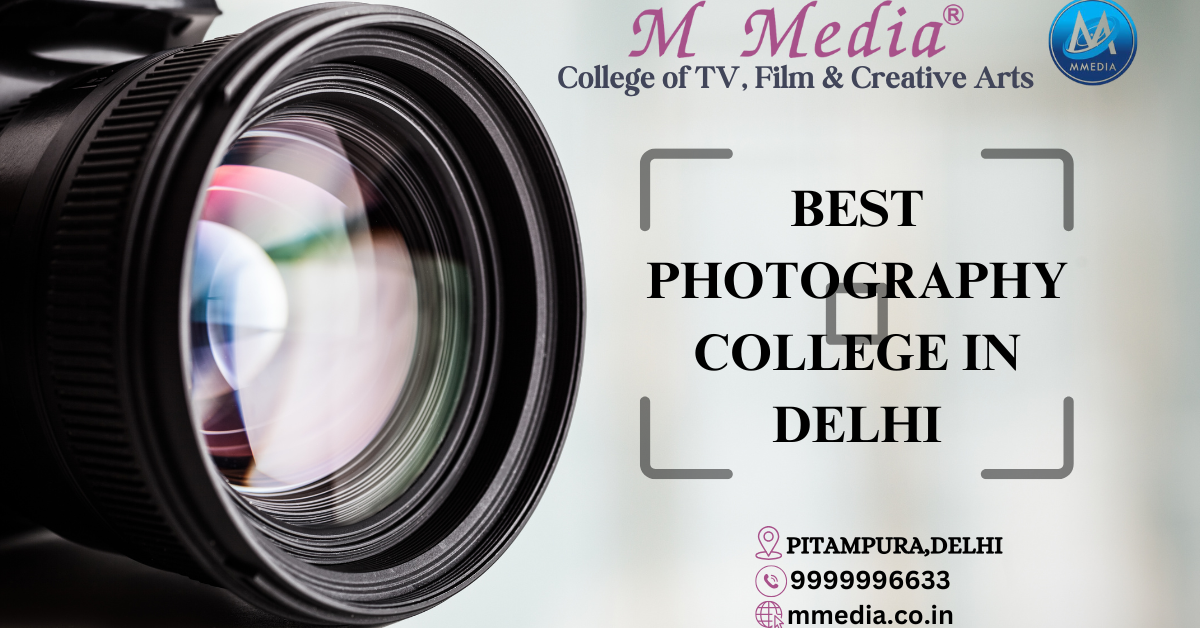
INTRODUCTION:
Best Photography College In Delhi, Photography is more than just capturing images; it’s an art form that tells stories, evokes emotions, and preserves memories. Choosing the right photography college is crucial for aspiring photographers who wish to turn their passion into a profession. A top photography college provides the perfect blend of technical knowledge, creative skills, and industry exposure to help students excel in this competitive field.
The Best Photography College In Delhi offers a well-structured curriculum covering fundamental and advanced aspects of photography, including camera techniques, lighting, composition, editing, and visual storytelling. Students learn through hands-on training, workshops, and real-world projects, allowing them to build a strong portfolio.
Experienced faculty members, often industry professionals, guide students in mastering various photography styles such as fashion, wildlife, commercial, portrait, and documentary photography. These colleges also provide access to state-of-the-art studios, high-end cameras, and editing software, ensuring students gain practical experience with professional tools.
Internships, industry collaborations, and guest lectures by renowned photographers further enhance learning and career opportunities. The Best Photography College In Delhi also encourage creativity and innovation, helping students develop a unique style and artistic vision.
Graduates from top photography colleges have excellent career prospects in media, advertising, fashion, filmmaking, and freelance photography. Whether aiming to become a professional photographer, photojournalist, or visual artist, the right college can shape a successful career in the photography industry.
IMPORTANCE:
Photography is a powerful medium that captures moments, tells stories, and expresses emotions. In today’s digital age, professional photography skills are in high demand across various industries, including media, advertising, fashion, journalism, and filmmaking. While passion and creativity are essential, formal education in photography plays a crucial role in developing technical expertise, artistic vision, and industry knowledge.
A structured photography course provides in-depth learning of camera operations, lighting techniques, composition, editing, and visual storytelling. It helps students understand the science behind photography, such as exposure, shutter speed, and color theory, allowing them to create high-quality images. Professional training also covers different photography genres, including portrait, wildlife, fashion, commercial, and documentary photography, giving students the versatility needed in the field.
One of the biggest advantages of formal photography education is access to advanced equipment, studios, and editing software. Practical experience with professional tools ensures students develop hands-on skills that set them apart in the competitive industry. Additionally, expert guidance from experienced photographers helps refine creativity and improve technical proficiency.
Networking and industry exposure are other key benefits of studying photography at a reputed institution. Internships, workshops, and guest lectures by renowned photographers provide valuable insights and career opportunities. Many colleges also offer portfolio development support, helping students showcase their best work and attract potential clients or employers.
Beyond career prospects, photography education enhances personal growth by fostering patience, attention to detail, and a keen artistic eye. It allows individuals to communicate ideas visually, explore new perspectives, and express emotions through their work.
In conclusion, photography education is essential for those looking to build a successful career in the field. It not only hones technical skills but also nurtures creativity and professional growth. Whether aspiring to be a commercial photographer, photojournalist, or creative artist, a strong educational foundation in photography paves the way for endless possibilities.
BENEFITS:
Photography is more than just capturing images; it is an art form that enhances creativity, improves technical skills, and opens doors to numerous career opportunities. Whether pursued as a hobby or a profession, learning photography offers several benefits that contribute to both personal and professional growth.
One of the key benefits of learning photography is creative expression. It allows individuals to tell stories, convey emotions, and share unique perspectives through visual art. Photography helps develop a keen eye for detail, composition, and lighting, improving artistic abilities over time.
Photography also enhances technical skills. A structured photography course teaches essential concepts such as camera settings, exposure, aperture, shutter speed, and editing techniques. Mastering these skills enables photographers to capture high-quality images in various conditions and styles, including portrait, landscape, wildlife, fashion, and documentary photography.
Career opportunities in photography are vast. Skilled photographers can work in diverse industries such as media, advertising, fashion, event management, and filmmaking. With the rise of digital content, photographers are also in demand for social media, blogging, and commercial branding. Additionally, photography offers freelance opportunities, allowing individuals to work independently and build a successful business.
Another major advantage is personal growth and mindfulness. Photography encourages patience, observation, and appreciation for the beauty around us. It helps reduce stress and promotes mental well-being by allowing individuals to focus on creative expression and storytelling.
Photography also fosters social connections. Joining photography classes, workshops, and online communities helps individuals meet like-minded people, exchange ideas, and collaborate on creative projects. These networks can lead to valuable friendships and professional partnerships.
With technological advancements, learning photography provides the skills to adapt to new tools and software. Proficiency in photo editing programs like Adobe Photoshop and Lightroom is crucial for enhancing images and staying competitive in the field.
In conclusion, photography is a valuable skill that enhances creativity, technical expertise, and career prospects. It also contributes to personal well-being, social connections, and lifelong learning. Whether for passion or profession, mastering photography is a rewarding journey that enriches life in many way


